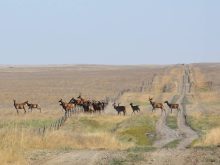Agribition signs deal
The Regina Exhibition Association and Canadian Western Agribition have signed a 10-year agreement that sets out space requirements and service level agreements for Agribition.
Typically, the agreement between the two organizations has been year-to-year, despite Agribition’s nearly 50-year history. Agribition chief executive officer Chris Lane said the agreement allows for better planning.
The financial terms were not disclosed but Lane said it does include clauses that address cost increases over the term.
Genomic research to receiving funding
Read Also

Bunge’s crop mix is changing
Bunge has predominantly been a soybean processing firm, but that’s about to change after the merger with Viterra with softseed processing and grain merchandising gaining ground.
Genome Canada and Agriculture Canada has launched the 2018 Large-Scale Applied Research Project Competition: Genomics Solutions for Agriculture, Agri-Food, Fisheries and Aquaculture.
About $30 million in funding is available through Genome Canada and up to $16 million from Agriculture Canada.
The competition will support projects that use genomics to advance the sustainability, productive capacity and competitive position of the Canadian agriculture, agri-food, fisheries and aquaculture sectors.
Successful projects can receive up to $4 million from Genome Canada and $3 million from Agriculture Canada over a maximum of four years, with a one-to-one co-funding ratio to Genome Canada’s contribution.
The deadline for submitting registration to Genome Alberta is Aug. 7 and Aug. 16 for Genome Canada.
For more information, visit Genome Alberta’s website.
Lakeland College launches new program
Animal assisted wellness is Lakeland College’s newest program, which will train professionals to safely incorporate animals into their line of work for a variety of purposes.
Animals are integrated into hospitals, schools, libraries, correctional institutes, rehabilitation programs, crisis response programs and veterinary clinics.
The online certificate program focuses on interpersonal relationships, the animal-human bond, animal assisted interventions, ethics of animal integration into settings, and animal welfare, health and wellness.
Students will learn to recognize strengths and limitations associated with incorporating animals in public and professional settings, identify behaviours that are indicators of stress in animals, apply ethical practices and identify health risks for both people and animals.
For more information, visit lakelandcollege.ca.














